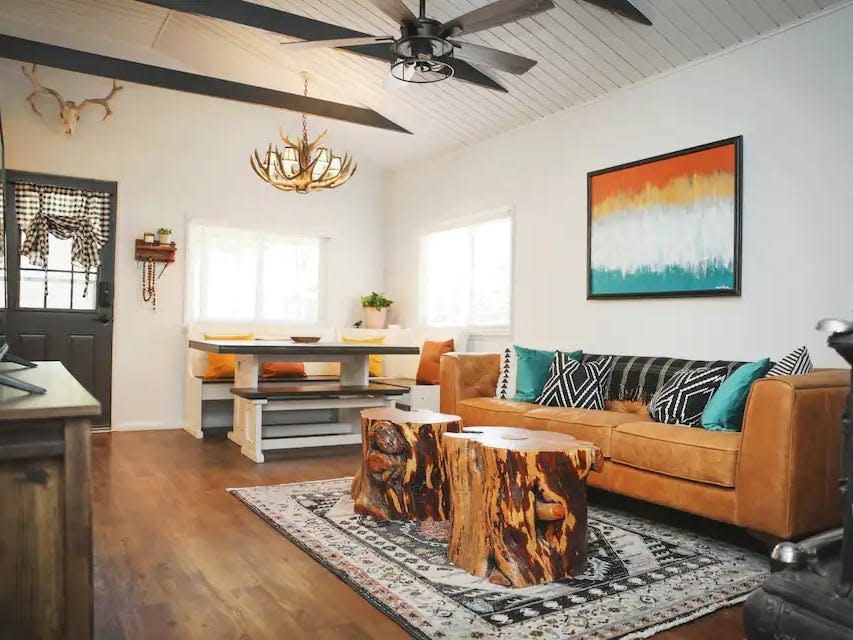After an unpredictable summer, Airbnb and Vrbo operators are deciding if the headaches of hosting are worth it
Airbnb and Vrbo demand is strong this summer, but a glut of supply continues to pinch hosts.
One host said he felt the need to find a niche, as an engagement destination, to stay competitive.
But some hosts said, even with the demand, the headaches of hosting are no longer worth the money.
It's been a fickle summer for Airbnb and Vrbo hosts, and despite extra effort to secure bookings, some are wondering if they should pull out of the short-term-rental game.
Anticipating a slower summer season, Missouri Airbnb host Ryan Villines concocted a "romance package" he offered to guests booking a stay at his one-bedroom property on the Lake of the Ozarks. Starting at $100, they could order chocolate-covered strawberries, heart-shaped rose petal bed displays, and wine for their stay.
It worked. A total of three engagements took place in the bedroom suite, which includes floor-to-ceiling windows with sweeping mountain views.
But even for all his effort, Villines still took a hit this summer. He said last July he brought in a total of $7,000, but this July it dipped to $5,900, as bookings were harder to come by.
But Villines remains positive about hosting through the dip. "If you're not filling a niche, you're not that full," he said.

After a grueling summer, Airbnb and Vrbo operators are deciding if the headaches of hosting are worth it.
Even though the nights booked across the country increased 9% in July to 35.4 million compared to the same time last year, a glut of supply has caused the average nightly rates to decline, according to short-term-rental analytics site AirDNA.
This hyper-competitive market does not appear to be ending any time soon, meaning hosts have to decide if the added effort is worth it to stay booked, or if it's time to get off the short-term-rental rollercoaster.
The anxiety of anticipating guests needs has one host stepping back
In Phoenix, one of the most saturated short-term rental markets, hosts are feeling the pressure.
"It's the most overheated market I've ever seen in my career," Peggy Gascon, a Phoenix host who recently flipped her four Airbnbs into long-term rentals, previously told Insider.
Phoenix property manager Ric Kenworthy said across his 100 properties, occupancy was relatively stable compared to last summer. But Kenworthy estimates that overall revenue was down 15% for the summer.
In Pine, Arizona, Jen Kelman has hosted Phoenix weekend travelers in her two-bedroom cabin for the past two years. Riding the ups and downs of hosting, she can expertly anticipate the little things that make for a successful short-term rental.
She constantly visits the cabin to scan for small breakages in the fence that might let elk in, and traverses the yard for divots that guests' pets might have dug, which would allow in rodents.
She's found a niche, like Villines, partnering with a neighbor who provides fresh eggs from her backyard coop for guests, to emphasize the country feel of her cabin.
But even then, the anxiety of anticipating every little thing that could go wrong has gotten to be too much for Kelman, like if a powerful snowstorm rolls in and the guest doesn't have four-wheel drive.

"I can coordinate everything else, but I can't coordinate the weather," she said.
Her bookings this summer surprised her. Predicting a slowdown, she used Vrbo's boost feature, which propels her property to the top of the listing page in exchange for points she's earned from hosting.
Kelman still saw a slump in the numbers — last July she said she brought in $5,400 and this July she said she brought in $4,000 — but it wasn't the empty-calendar apocalypse she feared.
But even if the money remains good, Kelman is contemplating leaving the short-term-rental game altogether. The round-the-clock nature of hosting has started to get tiresome.
"I could be on vacation or out having drinks with friends, but I'm going to have to reply to Airbnb guests who can't get in or can't find the street," she told Insider.
She anticipates selling her property sometime in the near future, potentially as a turnkey Airbnb operation for another owner.
Are you a short-term-rental host deciding whether to stay in or leave the industry? Reach out to reporter Dan Latu at dlatu@insider.com.
Read the original article on Business Insider

